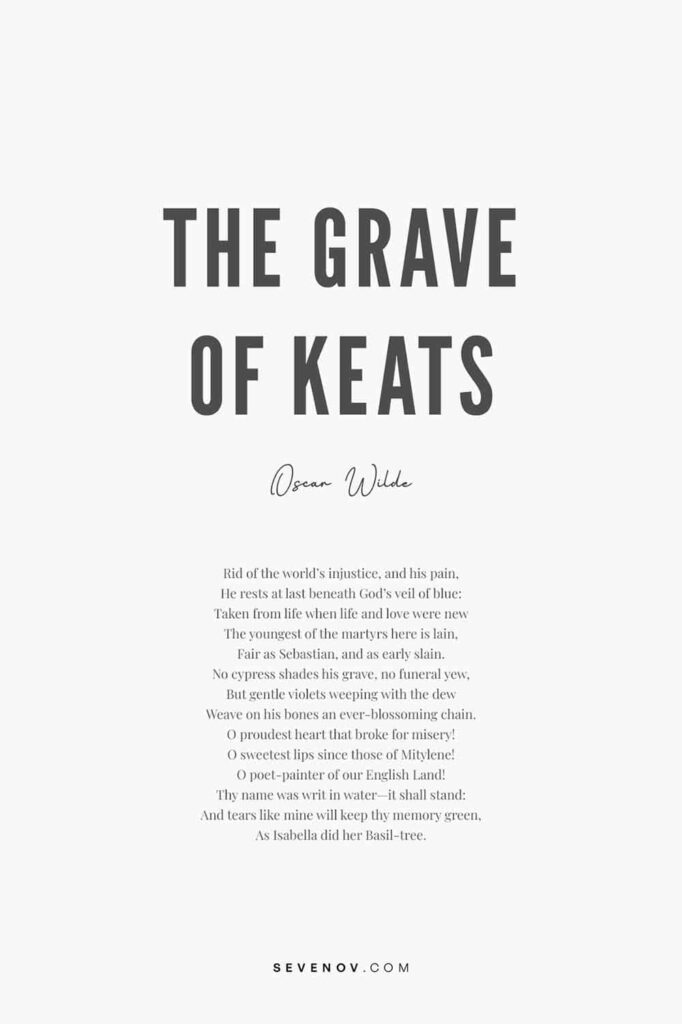
The Grave of Keats by Oscar Wilde
“The Grave of Keats” is a poignant poem by Irish writer, poet and playwright Oscar Wilde, which delves into the emotional and historical resonance of the final resting place of the renowned Romantic poet, John Keats. Wilde’s reflective and elegiac verse captures the profound sense of loss and admiration for Keats, whose brief life and enduring works have touched many. This poem is part of Wilde’s first poetry collection Poems. For those captivated by Wilde’s unique poetic voice, you can find Poems available online at PageVio.
1. The Poem
Rid of the world’s injustice, and his pain,
He rests at last beneath God’s veil of blue:
Taken from life when life and love were new
The youngest of the martyrs here is lain,
Fair as Sebastian, and as early slain.
No cypress shades his grave, no funeral yew,
But gentle violets weeping with the dew
Weave on his bones an ever-blossoming chain.
O proudest heart that broke for misery!
O sweetest lips since those of Mitylene!
O poet-painter of our English Land!
Thy name was writ in water—it shall stand:
And tears like mine will keep thy memory green,
As Isabella did her Basil-tree.

Download The Grave of Keats Poster
Size: 8″ x 12″ (2:3 ratio)
Format: PDF
Copyright information: For personal use only
Note: Actual poster background color is white. For the sample poster, the background is made gray for illustration purpose.
2. The Grave of Keats Analysis
“The Grave of Keats” is an elegy, a mournful and reflective poem written to lament the death of John Keats. The poem focuses on the untimely death of Keats, comparing him to historical and mythical figures to underscore the tragedy of his loss and the beauty of his life and potential. Here is a breakdown of the imagery and references within the poem:
Rid of the world’s injustice, and his pain, He rests at last beneath God’s veil of blue:
These lines suggest that Keats suffered from the injustice of the world and endured personal pain. Now, in death, he is at peace, lying under the sky (“God’s veil of blue”).
Taken from life when life and love were new / The youngest of the martyrs here is lain,
Keats died young, at the beginning of his life and potential experiences of love, which positions him as a martyr, a person who dies for a cause.
Fair as Sebastian, and as early slain.
This reference is to Saint Sebastian, a Christian saint and martyr traditionally depicted as a beautiful youth pierced by arrows. This comparison emphasizes Keats’ beauty and his untimely death.
No cypress shades his grave, no funeral yew,
Cypress and yew trees are often found in cemeteries and are symbols of mourning. The absence of these trees suggests a departure from traditional mourning symbols.
But gentle violets weeping with the dew / Weave on his bones an ever-blossoming chain.
Instead of dark, mournful trees, the grave is adorned with violets, which could symbolize faithfulness, modesty, and simplicity. The dew on the violets is likened to tears, and the image of the flowers forming a chain over the bones represents nature’s tender embrace, perpetuating memory through beauty.
O proudest heart that broke for misery!
This line speaks to Keats’ empathy and compassion, suggesting that he was deeply affected by the suffering in the world.
O sweetest lips since those of Mitylene!
This is likely a reference to Sappho, the ancient Greek poet from the island of Lesbos, also known as Mitylene. Sappho was known for her beautiful lyric poetry; hence, Keats is being compared to her in poetic talent.
O poet-painter of our English Land!
Keats was both a poet and a painter, and his contributions were significant to English culture.
Thy name was writ in water—it shall stand:
This phrase suggests that while Keats may have believed his work was fleeting or impermanent (like writing one’s name on the surface of water), the speaker asserts that his memory and impact will endure.
And tears like mine will keep thy memory green,
The speaker is suggesting that through their mourning and remembrance, Keats’ memory will remain fresh and alive, much like watering a plant to keep it green.
As Isabella did her Basil-tree.
This is a reference to John Keats’s poem “Isabella, or the Pot of Basil,” where the character Isabella buries the severed head of her lover in a pot and grows basil over it, watered with her tears. It is a metaphor for nurturing memory with grief.
The poem, as a whole, serves to memorialize a figure who has passed away, ensuring that their memory will not fade, but will be kept alive through the act of remembrance and the power of art.
3. Conclusion
Should you like “The Grave of Keats,” you might find it intriguing to explore other poems authored by Oscar Wilde.




